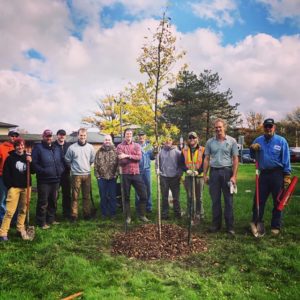 Over the years, the Urban Tree Alliance (UTA), a Madison-based nonprofit, has launched several innovative programs that promote environmental equity. The first of these programs, the Madison Canopy Project, continues to offer free trees to homeowners in selected low-income, low-canopy neighborhoods. Initially funded with the assistance of DNR Urban Forestry Grants, the program now has other funding sources and is kicking off its seventh year.
Over the years, the Urban Tree Alliance (UTA), a Madison-based nonprofit, has launched several innovative programs that promote environmental equity. The first of these programs, the Madison Canopy Project, continues to offer free trees to homeowners in selected low-income, low-canopy neighborhoods. Initially funded with the assistance of DNR Urban Forestry Grants, the program now has other funding sources and is kicking off its seventh year.
UTA’s newest program, the Housing Partnerships Program, provides tree planting and technical tree assessment services for multi-family residential properties. UTA received 2019 and 2020 DNR Urban Forestry grants to implement and expand this program.
Why the focus on multi-family residences, you may ask? “Through our work in Madison neighborhoods, we have regularly encountered unmet opportunities for tree planting at thousands of multi-family properties,” explains Jeremy Kane, Director of UTA.
The lack of trees at these properties may be due in part to the unique challenges that must first be overcome. Multiple stakeholders are involved, and a different communication strategy is needed. “We’ve found that complex relationships between tenants, property managers, and property owners requires a new way of thinking about outreach,” says Jeremy. “We have to find good partners among all these groups, since each brings a different perspective on trees and tree maintenance.”
For the past year, UTA has been working closely with the Madison Community Development Authority (CDA). The CDA owns and operates 742 units of public housing and 115 units of multifamily housing for low-income families, people over the age of 50, and individuals with disabilities. In 2019, UTA inventoried and assessed the trees on all 42 CDA properties; they also planted 27 new trees. With their new tree inventories and assessments in hand, the CDA has budgeted additional maintenance funds to address tree removal, pruning, and treatments in 2020.
UTA will continue partnering with the CDA on additional planting projects and maintenance administration while looking for new ways to work with multi-family housing providers. “Working with Madison’s Community Development Authority has been a good way to get foothold in the multifamily realm and gain some working experiences,” says Jeremy. With this experience under their belt, UTA is now planning to undertake a GIS analysis of canopy trends for multi-family land uses in Madison and design an outreach program with the goal of enhancing and growing canopy resources for multi-family and rental residences.
Across the nation, organizations such as UTA are seeking to address inequities in urban tree canopy cover. Numerous studies (such as this one covering multiple cities, this one on Louisville, and this one on Washington D.C.) have demonstrated that low income is correlated with low canopy cover. Some of these studies have also noted that canopy cover tends to be lower in areas dominated by rental properties.
